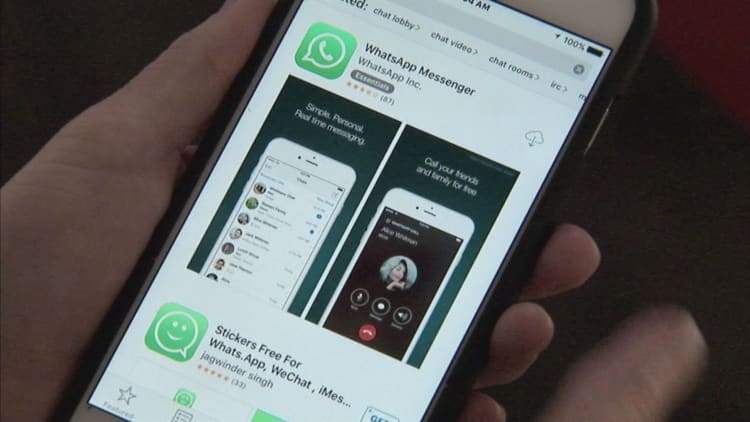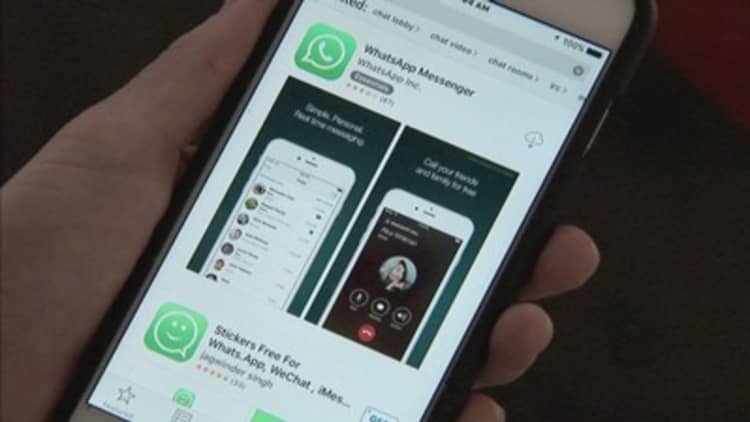
Facebook's WhatsApp messaging service, which is used by 1.2 billion people across the globe, is planning to move off of IBM's cloud and into Facebook's own data centers, according to a person familiar with the matter.
The WhatsApp move, which could begin later this year, would result in IBM losing a high profile customer for its public cloud. A source claims that WhatsApp has been one of IBM's top five public cloud customers in terms of revenue, and was at one point spending $2 million a month with IBM. (IBM says WhatsApp is not currently one of its top five public cloud customers.)
IBM's public cloud business lags behind Amazon Web Services (AWS), which is on top with 33 percent of the market in April, as well as Microsoft's Azure cloud, according to Synergy Research.
Facebook acquired WhatsApp for $19 billion in 2014 and has left the app running on the servers it has always used. Other companies that Facebook has acquired over the years initially used similar IBM SoftLayer servers, and Facebook was quick to bring them in-house, another source said. But with WhatsApp, Facebook has taken a much longer time.
Part of the reason was prioritization. When Facebook bought WhatsApp, it was already in the midst of a yearlong migration of its Instagram photo-sharing app, which it acquired in 2012, from AWS to its own data centers.
Also, Facebook separated its own Messenger messaging and calling app out from the core Facebook app months after the WhatsApp acquisition, and the social network's CEO, Mark Zuckerberg, didn't want WhatsApp to "get Facebooked" — in other words, to get integrated with its own apps too soon, a source said. Since then both Messenger and WhatsApp have gained hundreds of millions of users.
At IBM, WhatsApp is considered a poster child for its cloud, two sources said — just as AWS has the likes of Airbnb and Netflix to boast about, while Alphabet's Google points to Snap and Spotify. (Snap, which operates the Snapchat social media app, has committed to paying Google $2 billion and Amazon $1 billion for hosting over five years, the company disclosed in February.)

IBM hasn't broadly advertised its business with WhatsApp, although the company has detailed WhatsApp's usage in an off-the-record case study, a source said. It shows that WhatsApp runs atop more than 700 high-end servers split between data centers in San Jose, California, and Washington, D.C. At one point Facebook was spending nearly $2 million per month on the IBM cloud, a second source said.
"WhatsApp has been a great client of IBM Cloud as they used our global footprint and capabilities to scale their business," IBM said in a statement. "We are proud of the role of IBM Cloud in their success. It is completely natural for Facebook to seek synergies across their business."
Facebook did not immediately respond to a request for comment.
People sent 63 billion messages on WhatsApp on New Year's Eve, Facebook said. That usage requires hefty computing resources. Presumably, the WhatsApp app will operate more efficiently once it's using Facebook servers, which could help Facebook save money. It's unlikely — although not impossible — that WhatsApp's users will notice any changes during the migration.
A common move as companies grow
Relying on a third-party cloud provider is common for young companies, which have to choose their priorities. But cloud costs can add up as companies grow. Dropbox and Zynga are among the companies that have reduced their dependence on AWS.
When WhatsApp started in 2009, its engineers chose to run the underlying code on hosted servers from SoftLayer, which was then an independent company.
Typically in the public cloud, software that would normally run on a single server is chopped up into slices that are known as virtual machines, and can also be further divided into containers, all of which lets them run more efficiently with less hardware.
But WhatsApp has long circumvented this type of cloud resource, opting instead to use so-called bare-metal servers, which can deliver better performance. The SoftLayer public cloud was best known as a provider of these bare-metal servers when IBM acquired SoftLayer for $2 billion in 2013, and its bare-metal offerings remain available alongside virtual machines under IBM's Bluemix portfolio of cloud services.
While Facebook has housed its own servers and storage in co-located facilities from the very early days of the company, it started building its own data centers in 2010, following in the steps of Alphabet's Google. Facebook has also designed a lot of its own data center hardware to improve efficiency, and has released many of the designs under the Open Compute Project, allowing low-cost manufacturers to build and sell the hardware to both Facebook and other companies. The company has saved more than $2 billion in data center costs by building in accord with the designs that it has shared in the Open Compute Project, an executive said in 2015.
Last week Laurent Potdevin, CEO of athletic goods retailer Lululemon, faulted IBM for an outage of its website. But IBM did score a victory recently, signing Lloyds Bank to a 10-year deal, according to The Register.
Disclosure: CNBC parent NBCUniversal is an investor in Snap.
This story has been updated to clarify WhatsApp's ranking in terms of revenue among IBM public cloud customers.


